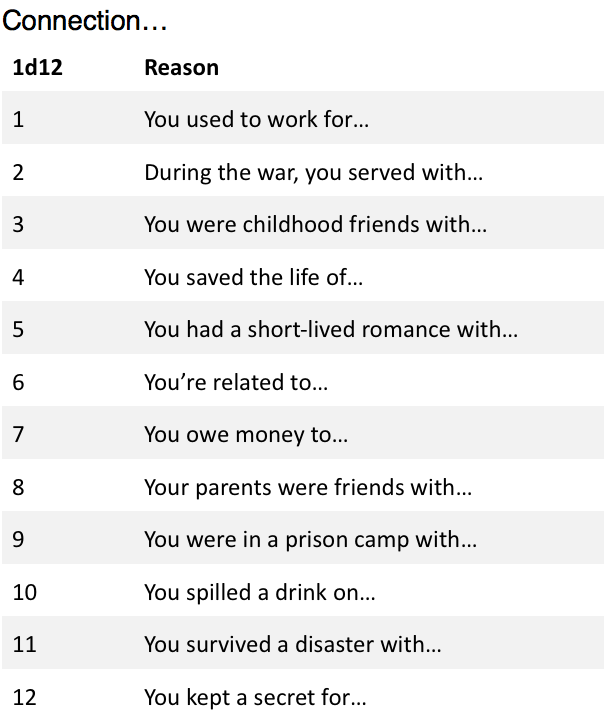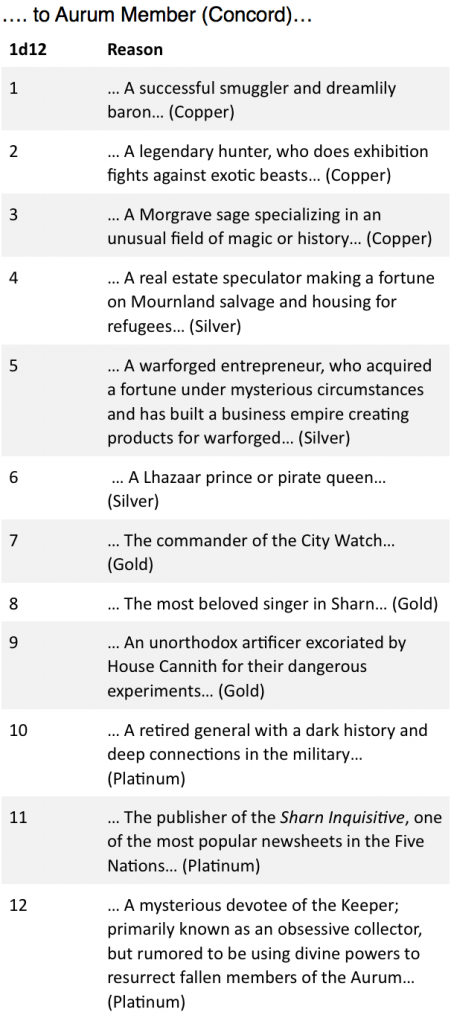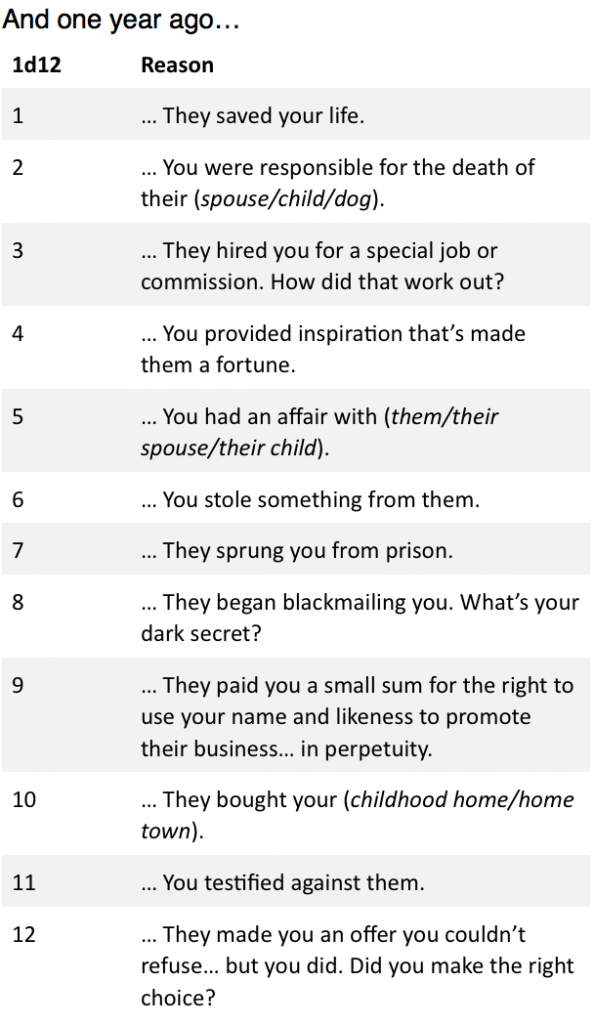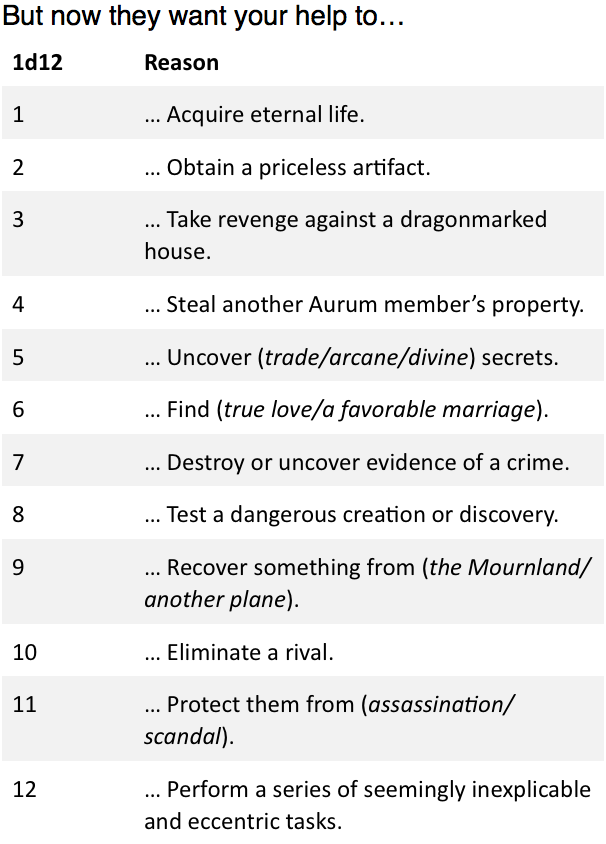Khorvaire is shaped by two powerful forces. The power of the aristocracy rests on land and tradition. The dragonmarked houses have used their gifts to carve out economic monopolies. How can a common person challenge these forces? If you don’t possess noble blood or a dragonmark, are you ultimately doomed to serve one of these forces?
The Aurum is a fraternal order that began in the Mror Holds; over the last century it’s spread across the Five Nations. Members of the Aurum are drawn from different religions, nations, races, and social classes. However, the order is highly selective in those that it allows to join. Notably, despite a general image as being a society of the wealthy and powerful, the Aurum rarely admits members of major noble families or dragonmarked heirs. Founder Anton Soldorak maintains that members of the Aurum must earn their place in the world, not simply stumble into it.
The Aurum is split into four levels, called concords. New members are admitted to the Copper Concord. While many believe that membership in the Aurum requires wealth, what the recruiters actually look for is influence and potential. To gain membership in the Copper Concord—the lowest level of the Aurum—you need to possess influence that will make you useful to other members. You could be a soldier, a member of the city watch, a prosperous merchant, a renowned actor, a respected sage in Morgrave, a member of a powerful criminal organization, a successful barrister… it’s a matter of impressing a patron with your talent, your influence, and most of all, your potential. Do you have skills or connections that will benefit the society? Or could you, with a little help? To move up in the ranks, you have to prove your talents and increase your influence. Members of the Gold Concord aren’t just actors, soldiers, or criminals; they’re crimelords, superstars, and generals. Members of the upper concords ARE invariably wealthy… but they’ve gained that wealth through their influence.
So what does the Aurum do? It’s a social club, with a hall in every major city in the Five Nations. It’s a philanthropic organization that supports local communities and arts. It’s a place where people with different political and religious beliefs can set those differences aside and talk; according to Soldorak, many of the most important negotiations of the Last War took place around a golden table. But ultimately, at the end of the day, it’s an organization that exists to increase the wealth and power of its members. Members of the Aurum are encouraged to assist one another and to exchange favors. Individually, Aurum concordians may not have the power of royalty or dragonmarked barons, but acting together they can accomplish great things.
So: the Aurum isn’t a SECRET society. It’s private, certainly; outsiders aren’t allowed into the halls. But even if the existence of the Aurum isn’t a secret, there are a host of conspiracy theories and stories about its hidden rituals and secret agendas. The most dramatic rumors speak of a cabal hidden within this cabal… a Shadow Cabinet of the most powerful individuals in Khorvaire. According to these stories, these concordians aren’t content to merely increase their own power; they are actively using the resources of the Aurum to undermine the Dragonmarked Houses and the old nobility of Galifar. On the surface this could seem to be a noble act. But the members of the Shadow Cabinet aren’t idealists working for the common good; they are simply determined to remove all obstacles to their personal power.
At its base, the Aurum is a society of wealthy and influential people. While the Aurum works together for the common good of its members, it’s not a tight-knit conspiracy like the Lords of Dust or the Dreaming Dark; it’s mainly a way to further justify the power of a few very powerful individuals. As such, there’s a few primary ways to use the Aurum.
- As an enemy. Need a powerful foe for the players… who’s not TOO powerful? An Aurum concordian has power and influence, but can be driven by entirely selfish or eccentric goals. They aren’t trying to conquer the world; they’re trying to drive down property values in High Walls so they can buy a block of tenements on the cheap. If an Aurum concordian wants the Orb of Dol Azur it probably ISN’T because they’ll use it to kill everyone in Sharn; it’s just that they need it to complete their collection. Kaspar Gutman, the “Fat Man” of The Maltese Falcon, would definitely be in the Aurum if he lived in Eberron.
- As an ally. All the things that make a concordian a useful enemy also make them good patrons for player characters. They have wealth, influence, and they’re generally not attached to any massive agenda; they’re driven either to increase their own wealth and influence, or simply to pursue their own interests. A concordian could be an eccentric collector seeking a rare artifact, an inventor who needs a priceless component only produced by House Cannith and reserved for the use of its heirs, or a ruthless criminal who’s going to draw the PCs into a web of intrigue. But again, they aren’t tied to any nation, any faith, or any vast and ancient force; they’re just people with money and things they want.
- As an organization. An ambitious player character could be an aspiring member of the Aurum. Someone with the Criminal background could take the Aurum as their “criminal connection”—it’s not exactly a criminal organization, but it has criminal members and a great deal of shady influence. The Noble background couldreflect a character with a hereditary path into the Aurum… though again, Aurum membership must be earned. While members of the society will treat you with respect if you’re the child of a Platinum Concordian, and while that connection will get you past a lot of obstacles, you’ll have to prove yourself before you can wear the rings of a concordian.
- The Shadow Cabinet. Part of the appeal of the Aurum is that it’s a society of individuals without a deep agenda. But what if there IS a group of shadowy masterminds pulling the strings from deep within, using the resources of its influential members to shatter the status quo? This storyline can be more compelling if players have already become entangled with the society in another way… if what appeared to be a club of eccentric and self-centered people are now revealed to be evil masterminds.
What’s my connection to the Aurum?
In the novel The City of Towers, the protagonist Daine has previously worked as a bodyguard for Alina Lorridan Lyrris, an Aurum concordian with great wealth and questionable morality. Daine doesn’t like or trust Alina, but when he and his companions are down on their luck, Alina is willing to offer them work. With the approval of the DM, any character could have a connection to an Aurum concordian. The first three tables establish a past connection to a member of the Aurum, while the DM can use the fourth table to determine the concordian’s current agenda.
Thanks as always to my Patreon backers, who keep this website going! And if you’re not up to date on Eberron in fifth edition, check out the Wayfinder’s Guide to Eberron and Curtain Call!
Q&A
What kind of economic sectors are not monopolized enough by Dragonmarked Houses (and the feudal nobility) to justify an Aurum concordian’s wealth?
First off, even within the fields monopolized by the houses, not everyone works directly for the house. Most people within a field are licensed by the house. They may receive training from the house; they pay a percentage to the house; they agree to meet house standards or follow certain practices (thus, standardized pricing for a longsword); and in exchange they can use the house seal. The Aurum includes many people whose businesses are licensed by a house. The most beloved singer in Sharn, from the list above, is surely licensed and booked by Phiarlan or Thuranni; but they aren’t necessarily an heir of the house, which means they will always be an outsider.
Beyond that, the house monopolies themselves aren’t absolute. Cannith dominates manufacturing, but they don’t control fashion or construction. Property management and real estate are options in places where the feudal monarchy has sold off land (which is certainly the case in parts of Breland and other nations). The houses have no role in the military, in religion, in crime, or in civic administration (examples of all those being given above). Anton Soldorak derives his wealth from mines, as do many concordians from the Mror Holds. Though by the principles of the Aurum, to rise to the upper concords you’d have to do more than inherit a mine; it’s Soldorak’s business accumen that turned those mines into an empire and founded the largest mint in Khorvaire.
So is the Shadow Cabinet a real thing, or not?
I think it is, but ultimately that’s up to each DM. The important thing is that even if it is real, most members of the Aurum itself don’t know about it. They may be tools of its schemes, and they might even support it if they did know about it, but it’s a secret society within a semi-secret society.





In response to the question as to what would justify an Aurum concordian’s wealth in an economy seemingly dominated by dragonmarked houses and landed nobility, here’s another possibility: financial instruments and the markets they create.
Although we’ve never in canon sources seen things like joint stock companies with letters of marque, brokerages, or gnomes shouting at each other across the pit of a commodities exchange, but I think they can fit into the mileu of Eberron with its interwar and Victorian influences . House Kundarak might dominate banking, but banks are only one group of actors in our real life financial world and there is no reason the same wouldn’t be true in Khorvaire.
For example, in my Karrnath, a wealthy family in Atut earns its fortune by offering people money in exchange for a contract on the future use of their corpses as necromantic labor. This family might include Aurum concordians. But also, these contracts are essentially futures or options, so in my Atur there has risen a bustling Corpse and Securities Exchange where speculators and hedgers buy, sell, and short these contracts and their underwritten insurance policies, one at a time or bundled together like a CDO. It’s easy to see such a place full of Aurum concordians. And if you want to use the Aurum in its traditional role as villains, imagine what happens when a young Copper concordian went long on corpses of the poor when he should have gone short becaise the poor are living longer and he just happens to know another concordian with access to several vials of quarantined scarlet plague…
Sounds good to me!
Great ideas! I assumed Kundarak also took care of financial services but, you’re right, there’s no reason to assume they do. Thinking of it, their banking services are in fact quite elementary: with Kundarak you can keep things safe and withdraw money from a deposit account wherever you’re if I recall correctly… and that’s pretty much. I don’t recall anything about Kundarak actually lending money, funding investments, offering insurance policies, and so on.
I don’t recall anything about Kundarak actually lending money, funding investments, offering insurance policies, and so on.
Per Dragonmarked, Kundarak does manage loans and license moneylenders. However, I could see this as being a limited practice… simple loans, but not extensive speculation. By contrast, that seems like exactly the sort of thing that Anton Soldorak and other Aurum members would be involved in.
In my game Kundarak & Cannith work together to make the arcane equivalent of checkbooks/credit sticks.
Siviis prints them, Canith makes the devices (ie stamps), Kundarak wards them & maintains the authenticity trinkets. Use a stamp to verify the authenticity of the buyer’s Kundarak warded Siviis issued identification papers/merchant “kiosk” (for lack of a better word) depending on which side you are on. Write the agreed upon amount on a simple kundarak warded Siviis printed contract you can fill in what each side is offering, use your stamp to verify the contract & sign your personal arcane mark into the contract’s own kundarak ward.. whomever is getting the money brings the contract to a Kundarak branch & the funds are transferred. effectively it’s arcane multifactor authentication similar to our NFCpay smartphone things (ie apple pay/googlepay/etc).
For smaller sums, a vendor might do with an inexpensive reusable stamp that may not be entirely up to date. For larger sums, a vendor might go with a single/limited use one that is tied directly to Kundarak & gives an immediate confirmation that the buyer can/can not afford it with insured results in the unlikely event of forgery.
I also have house issued Kundarak/Siviis certifications for most any business working in a dragonmarked house industry akin to the health inspection report we can see at nearly any restaurant. Touch the seal in the corner & say the word (ie verify), if it doesn’t turn black It’s still valid. Touch your stamp to the mark in the corner to verify that the whole thing is a legitimate seal with a legitimate house issued ward rather than a fake.
It might be overly complex, but I used to work in IT so had a lot of experience with these kinds of things making it more simple in play & I’ve never had a player try to forge their stamp
Just wanted to say I love the background tables. Hope we can see more like that!
Very nice post Keith! I wonder who could be an alliance of the shadow cabinet… ashbounds? House tarkanan?
Also, very stupid what if: what if Anton Soldorak would develop a siberys Mark? Would something change for the Autumn?
Also, very stupid what if: what if Anton Soldorak would develop a Siberys Mark? Would something change for the Autumn?
It’s up to you, really. In my Eberron, Soldorak is far too ambitious to be content simply joining House Kundarak. As I mention above, it’s not that the Aurum has an absolute rule against admitting members of houses or nobles. They definitely admit excoriates (as shown by option 9 on the second table); it’s simply that they aren’t looking to admit people who are already well-positioned in the current status quo. I could actually see the Shadow Cabinet specifically targeting foundling heirs of Siberys hoping to use their marks the help undermine the houses.
I mean the opposite: by canon dragonmarked houses don’t allow siberys marks to be independent. That would put the aurum under a lot of attention
Wow! Looks like my question on the Aurum was right on time! Thanks for your answer. I love the hook table by the way.
You mention the Aurum is a semi-secret society. That means, who knows a given person is an Aurum concordian? Other concordians, for sure. And everyone that understands the meaning of wearing loads of identical metal rings on one’s hand (do they do it all day?). Overall, though, how much publicity is there of someone’s Aurum affiliation?
In the Aundair campaign I’m running, the Arcane Congress is in league with Aurum concordians to challenge the Houses (or maybe Arcanix leaders are in the Aurum), and they’ve enlisted house Tarkanan to help with the dirty work. Imre Levalle, the crooked Wayfinder trustee and Aurum concordian, may be very useful here to provide nice artefacts… First stage of the plan: helping house Tarkanan into Fairhaven’s underworld (using connections in the city’s watch), while creating dissent between and within Dragonmarked houses. In particular, Aundair seems to be the perfect place for an Orienne vs Lyrandar clash, with Stormhome at one end and Passage at the other. Framing Lyrandar radicals (the “Storm Front” of the Dragonmarked supplement) for terror attacks on lightning rails is a good start.
Initially I had First Warlord Adal as the mastermind but, reading your post, I’m considering making him a puppet of the Shadow Cabinet. Indeed, Adal is power-hungry: he wants to rule Aundair and, then, Galifar, and do so unhindered. The Houses are a hindrance, especially for someone as involved in the Arcane Congress as he’s. That was my initial idea. But, what if Adal saw the traditional aristocracy as another hindrance? He would need powerful allies to suppress those well-established families. He would also need an expanded bureaucracy to replace feudalism. Unfortunately for him, those skilled civil servants he appointed may well turn out to be the true masters of the State… And Antus ir’Soldorak will have his way.
That means, who knows a given person is an Aurum concordian?
The point to me is that the existence of the organization isn’t a secret and that it’s not something members HAVE to hide; like the Freemasons, the Aurum is a social organization that engages in philanthropic work, and there’s nothing inherently or provably sinister about it. With that said, that doesn’t mean that the common people know anything about it or that most members DO reveal their association with it (and most people don’t know the significance of the rings… I’d make that something like a DC 16ish History check). Looking to the example concordians, it’s not as though the most popular singer in Sharn starts off every concert by saying “Hi everyone! I’d like to give a shout out to the Aurum.” However, if it were to come out in a newsheet, most people would shrug and say “Of course she’s in the Aurum—anyone with that kind of money would be, wouldn’t they?”
So it’s on that precipice between secret and public… with the Shadow Cabinet as the absolutely secret organization hidden within.
I see, thanks.
Here’s how i would play the shadow cabinet.
To me its not another tier of the frat. Its not like a secret door within the already semi secret room. Think of it as a conceptual society inside the society – an agenda within the agenda.
The main goal of your avarege concordian is personal power and wealth, usually on a scope ranging from large city to international level. But there a forces out there whos machinations go beyond millenia. Imortals to whom monetary resources is water, who are driven by motivations that started before the origin of man.
The Aurum is the perfect board of pawns to the LoD, Chamber, BoV, DD. Even Areanal, or the daughters of Sora Kell could play at the ambitions of the Aurum members. Any of these could be the shadow cabinet – or be A shadow cabinet – for who is to say that they dont all battle it out through small subtle moves and exchange
BUT if you like to keep it down to a level the pc can relate to you could have an intelligence agency like the Royal Eyes of Aundair trying to stir up a trade war on barges on the Brey river using Aurum influence in both Thrane and Breland
If you are playing the big forces the question would be whether Soldarak and other notables are in the know. Is he, for instance, an instrument to LoD, or is he even a rakshasa himself
What kind of benefits do you get from being in the different ranks in the Aurum. Is it just a club membership thing where you get to mingle with peers on the same level as you or are there more concrete benefits- backstage tickets to shows, access to exclusive prestige classes, free copies of the dwarven digest?
On a concrete level, being a member of the Aurum gives you access to Aurum halls, which are luxurious and well provisioned. There are likely areas and services (spellcasting, mercenaries) within a particular hall that are only available to members of the higher concords; this would vary by hall and thus be in the hands of the DM. Beyond that, the primary benefit is networking. It’s not that you automatically get backstage tickets to shows for being an Aurum member, it’s that you’ll see the theatre director at the hall and can ask him for tickets. Likewise for prestige classes: there’s not some regular teaching schedule (Purple Knight classes every Farday!) but if you’re interested in studying some unusual path, it’s possible that there’s an Aurum member who can teach it… or at least, who can point you in the direction of someone who can.
Again, this is why the Aurum chooses members based on their influence: because members using their influence to help other members is the primary benefit. You don’t ask favors of people above you in rank, so the benefit of higher rank is, again, access to a wider range of connections and services. Note the example on the Concordian list of the Keeper priest who may be resurrecting other Platinum Concordians. Again, that’s a personal favor to his friends, not an automatic right of rank… but it gives a sense of how useful the rank could be.